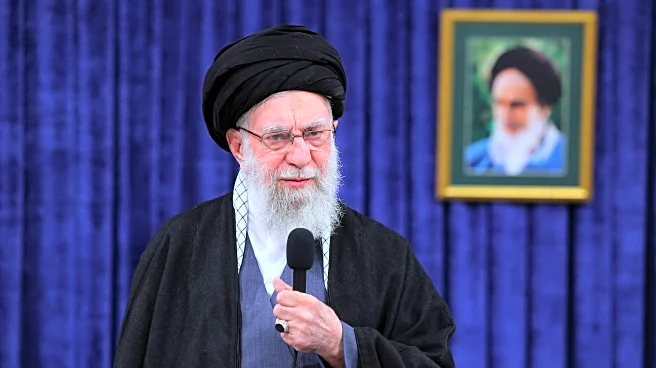What's Happening?
The White House, under President Trump's administration, is contemplating a controversial move to withhold back pay for federal employees furloughed during the ongoing government shutdown. This potential policy shift, suggested in a draft memo, challenges the traditional interpretation of the Government Employee Fair Treatment Act (GEFTA), which has been understood to guarantee back pay for furloughed workers once a shutdown concludes. The administration's stance has sparked significant debate, with President Trump indicating that back pay might depend on the individual worker, suggesting some may not 'deserve' it. This development comes as approximately 750,000 federal workers face furloughs, with many continuing to work without pay until the shutdown is resolved. The draft memo's existence contrasts with Trump's assurances to military personnel that they would receive their pay despite the shutdown.
Why It's Important?
The potential withholding of back pay for furloughed federal workers could have significant implications for the federal workforce and the broader economy. If implemented, this policy could exacerbate financial instability for affected workers, many of whom rely on timely paychecks to meet their financial obligations. The move could also lead to increased tension between the administration and federal employee unions, which have already criticized the draft memo as a misinterpretation of the law. Furthermore, this decision could set a precedent for future shutdowns, altering the expectations and financial planning of federal employees. The controversy also highlights the ongoing political struggle over government funding and the impact of shutdowns on public services and employees.
What's Next?
As the shutdown continues, discussions around the legality and ethics of withholding back pay are expected to intensify. House Speaker Mike Johnson and other political leaders will likely engage in debates over the interpretation of GEFTA and the rights of furloughed workers. The administration's stance may face legal challenges from unions and advocacy groups, potentially leading to court battles. Additionally, the political ramifications could influence upcoming negotiations to end the shutdown, as lawmakers weigh the impact on their constituencies and the federal workforce. The outcome of these discussions will be crucial in determining the financial future of affected federal employees and the resolution of the shutdown.
Beyond the Headlines
The draft memo and the administration's approach to the shutdown reflect broader efforts to reshape the federal workforce, including potential layoffs and restructuring. This situation underscores the tension between the administration's goals of reducing government size and the need to maintain a stable and effective public service. The ongoing uncertainty and potential financial strain on federal workers could lead to long-term impacts on employee morale and retention, affecting the government's ability to attract and retain skilled workers. The situation also raises ethical questions about the treatment of public servants and the responsibilities of the government to its employees during fiscal crises.










